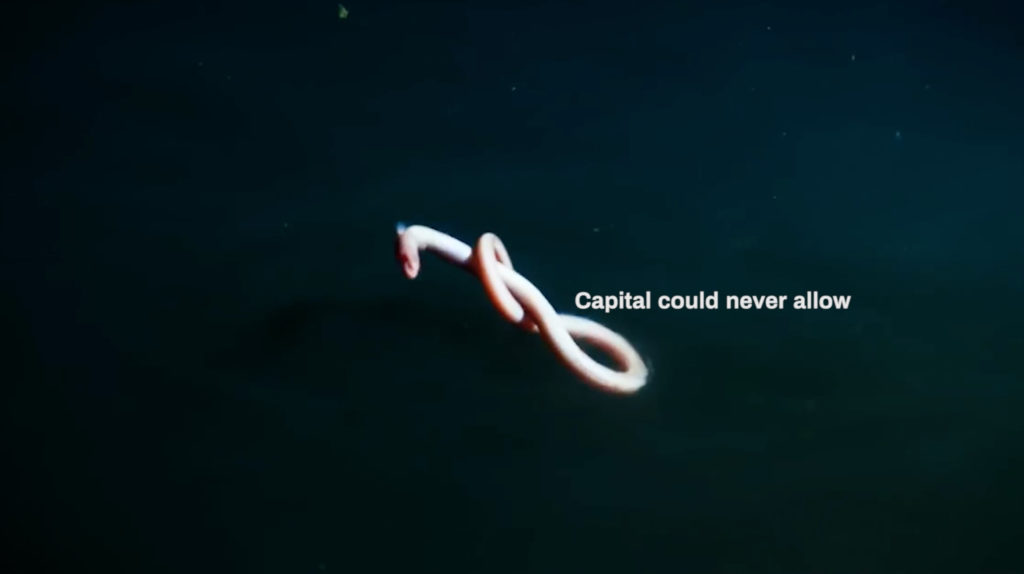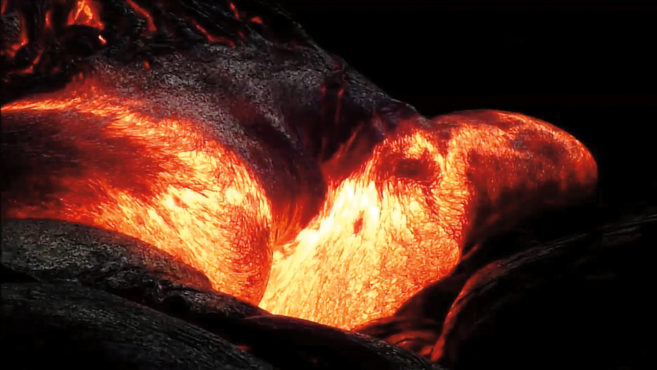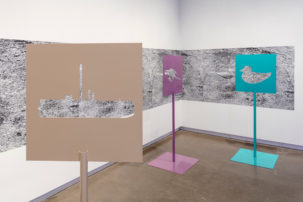“4 Waters: Deep Implicancy” arranges a fever of the world that builds up to a revelatory fracture, held inside the power of an earthquake. With their second experimental collaboration (following Serpent Rain 2016, commissioned by Stefano Harney), Denise Ferreira da Silva and Arjuna Neuman present a 29-minute film of the same name, installed in a darkened room, with accompanying sound and beanbag chairs sprawled on the floor for viewing. Through a composition of images of world history, extractive violence, nuclear testing, slavery and revolt, forced migration, war, the magma underground and desires held in cellular life, the collaborators mean to continue unthinking the world through the project of a film without time. Whose time is important: through non-narrative views of the world that cross material and metaphorical markers between sea, sky, the molecular and the bird’s eye, Ferreira da Silva and Neuman make a case for total entanglement that begins to unfurl the violence of certainty in Western European knowledge and linear time. This type of certainty incessantly assigns value and hierarchy according to discrete categorization. It determines who is “Other,” which natural resources are useful and profitable, what human and non-human costs are to be endured—and by whom—and the centring of the human within history.
4 Waters is arranged loosely into four chapters by element (Air, Water, Earth, Fire), which seem to exist to provide negative contrast: each element’s title screen features an overlaid, transparent rendering of one of Plato’s geometric solids, assigned to represent each elemental form. In its pithy text that turns theory into poetry at the best of times, the film calls out Plato (and therefore all like him) for “reduc[ing] the basis / of existing and knowing / to lethal abstraction,” something 4 Waters itself manages to avoid, never forgetting the evocation of matter.
“Deep implicancy” describes a shift to thinking about knowledge and difference without separation, as Ferreira da Silva explains in an accompanying reading. It’s the idea that each part, though individual, is representative and reflective of the whole, not separate from it or others. 4 Waters imagines these relations through the connective tissue of water and the borders where water bleeds into other natural and social elements, including, but not bound by, the human.
Microscopic agents bloom open in a restless elemental rhythm that resembles a quick and deep heartbeat at two simultaneous speeds. Donna Summer and Can’s drum-and-Moog-steeped song samplings are sutured with images into pulsing formation. The intermittent, bass-heavy soundtrack of 4 Waters weaves above and below field recordings of moving water at sites near Lesvos, Haiti, Marshall Islands and Tiwi. A common sound of water emerges across these different islands—as rain, stream, trickle and fraught human passageway.
The film continuously unspools and widens in all directions, depending on the thread you pick to follow. Ferreira da Silva and Neuman’s argument for total entanglement is informed by a diverse knowledge of philosophies (Kant, Descartes, Leibniz, Hegel, Foucault), classical physics, quantum mechanics, colonial theory and history. I found myself in a rabbit hole chasing errant strands for this review, asking myself, What matters? Thinking, Maybe it all does. What saves 4 Waters from feeling laden with theory, however, is exactly its soundtrack, the persisting beat that grounds the work’s more challenging philosophical proposals and gives them sensory form, which feels relieving, necessary. This is perhaps a success of collaboration (how to make theory feel light?), and the editing/mixing skills of Neuman and a small team.
A separate room next to the screening area houses the collaborators’ research archive for 4 Waters, two years’ worth of collected texts, recordings, photos, interviews, scientific studies and music playlists. (Anyone can access the vast materials remotely through a Google Drive link provided.) This is a lot of information, but you don’t have to chase it; every point is a beginning.
As an exhibition, “4 Waters” doesn’t reach for epic scale, and that is its accomplishment. The epic is a mistake of the colonial mindset: the idea that the whole can be captured, encompassed, presented and consumed. In the research archive, I gravitate to the book by Sappho, in which fragments translated by Anne Carson mark out places for missing words and phrases, lost from the ancient Greek text. The book at first seems out of place, but here too, as occurs on landscapes throughout the film, time is cleaved onto rapturous space.

Denise Ferreira da Silva and Arjuna Neuman, 4 Waters: Deep Implicancy (still), 2018. Digital video, 29 min 10 sec.

Sappho, If Not, Winter, p. 15. Translated by Anne Carson. New York: Random House, Inc., 2003.







